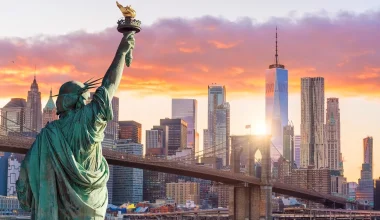The long-awaited launch of adult-use cannabis sales in Virginia may finally be at hand after Democratic candidate Abigail Spanberger was elected governor on Tuesday.
While Spanberger’s election was biggest and most positive development for the cannabis industry to emerge from Election Day on Tuesday, elsewhere across the country, voters seemed keen to restrict or outlaw legal marijuana businesses.
Despite legalizing adult-use cannabis in 2021 and a medical cannabis industry worth roughly $180 million annually, Virginia has yet to set up regulated commercial adult-use cannabis activity.
Bills to do so were repeatedly vetoed by outgoing Republican Gov. Glenn Youngkin over the past few years.
When will adult-use marijuana sales start in Virginia?
That’s set to change after Spanberger, a former member of Congress, defeated Republican nominee Lt. Gov. Winsome Earle-Sears 57.4% to 42.4%, according to NBC News.
Her election signals a significant growth opportunity for cannabis in Virginia, where medical marijuana operators rang up $30 million in sales in two months over the summer.
In campaign trail interviews, Spanberger pledged to work with state lawmakers to create “a legalized retail market for cannabis that both prioritizes public safety and grows Virginia’s economy.”
By contrast, Earle-Sears, to whom NORML gave an F rating, once boasted that she fired an employee from her business after she “found out he was on marijuana.”
The good news in Virginia comes along with mixed signals on the local level in states where adult-use cannabis is legal.
Voters in Washington, Ohio and Michigan approve cannabis business bans
Voters in Yakima County, Washington, said they want to keep a ban on commercial cannabis activity in place.
The nonbinding resolution, which at least one county commissioner said she would respect, passed with 12,016 votes in favor to 9,026 against, according to the Herald Republic.
Voters in tiny Lima Township, Michigan, rejected a ballot initiative that would have legalized cannabis businesses in the area.
According to MLive, the voter initiative followed a federal lawsuit filed against town officials that was later dropped.
And in Niles Township, near the Indiana border, 61% of voters rejected changing zoning laws in the city that would have allowed up to 29 cannabis businesses.
Meanwhile, 58% of voters approved an outright ban on cannabis stores, WNDU reported.
That follows city officials in April passing a law legalizing an unlimited number of cannabis stores, according to the news station.
Michigan city voters approve industry-friendly cannabis license cap
Similarly, in Bellville, Ohio, voters dismissed allowing a cannabis store within village limits by 449 votes against to 172 in favor, according to the Mansfield News Journal.
It’s one of 19 jurisdictions in the rural county that prohibit legal commercial cannabis activity, the newspaper reported.
As in other states, communities in Michigan and Ohio have the power to regulate or ban licensed marijuana businesses.
In Menominee, Michigan, voters approved a measure capping the number of cannabis stores in city limits to no more than nine.
According to Fox-11, there are already nine dispensaries in town, but four more have applied for permits.
Many operators in Michigan have complained of what they say is an oversaturated market.
Medical Disclaimer:
The information provided in these blog posts is intended for general informational and educational purposes only. It is not a substitute for professional medical advice, diagnosis, or treatment. Always seek the advice of your physician or other qualified healthcare provider with any questions you may have regarding a medical condition. The use of any information provided in these blog posts is solely at your own risk. The authors and the website do not recommend or endorse any specific products, treatments, or procedures mentioned. Reliance on any information in these blog posts is solely at your own discretion.






